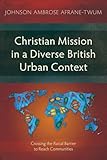Several years ago, Johnson Ambrose Afrane-Twum was under consideration to become a black lead pastor of a white-majority church in the United Kingdom, when a white friend approached him.
Christian Mission in a Diverse British Urban Context: Crossing the Racial Barrier to Reach Communities (Studies in Missiology)
Langham Academic
234 pages
$24.71
“Johnson, everybody here knows that you can lead this church,” he said. “There is only one problem: Some people say they don’t want you as a pastor because you speak with a Ghanaian accent.”
“I thought to myself, what has an accent got to do with this?” said Afrane-Twum. “Is this the way God wants us to do church?”
Originally from Ghana, Afrane-Twum had planted churches in three West African countries through the Calvary Chapel movement before immigrating to the UK in 2005 to further study theology and leadership. He soon observed many newcomers to Britain starting vibrant congregations—and numerous local churches dying. These realizations, in tandem with his challenging experiences working cross-culturally, led Afrane-Twum to research how African Christian leaders could better work with UK locals to revitalize faith across the country.
In Christian Mission in a Diverse British Urban Context, Afrane-Twum explores African identity in UK churches, the cultural barriers Africans face in the UK, and the need for more creative ways to reach out to diverse communities. He recently spoke with CT about the African migrant community in the UK and its potential to bring revival to the body of Christ in that country.
How would you assess the current relationship between the established UK churches and African immigrant congregations?
Some people refer to the black churches in the UK as doing reverse mission. The UK brought the gospel to us in Africa, they say, and now we are bringing the gospel back to them. But this is often a misnomer. If you are an African in the UK today and you are tending only to your own kind and not to the wider community, then there is no reverse mission. That issue must be addressed. How do we partner with the white churches so that we can be effective in our missionary work to the whole UK and not only to our fellow black Africans?
Many white-majority churches allow migrant churches to use their buildings. But for an effective partnership, we must go a step further. Both the African immigrant church and the UK church agree on winning souls to Christ, but we are subject to cultural changes that have occurred in the past few decades because of migration. The first thing we must do is to commit ourselves to building a spiritual relationship of mutual love and trust. We need to help the white churches know that we are here on a mission. At the moment, they think we are here just for our own people.
God has providentially allowed black churches to come over here to sustain the UK churches. If we have a spiritual relationship of mutual love and trust, then we can work together for kingdom goals. If the white churches come to believe that they need revival and that we have been called to help them, then the next question is, “How we can best help?” How do they see us, and how do we see them? If there are cultural biases, then we have to address them. Achieving the goals of the kingdom of God should be our highest purpose, even though we may have other differences.
You chose four distinct churches to study for your research on intercultural ministry in the UK. What did you find?
Two congregations (All Nations Church in Wolverhampton and Harborne Baptist) are white-majority churches that have worked hard to bring in people from multiethnic backgrounds. My study of All Nations revealed that second-generation migrants in the UK can not only adapt to the lifestyle and culture of the wider white community but, if nurtured properly by local leaders, can themselves become leaders in multiethnic churches.
At Harborne Baptist, I saw how important it is for pastors to train local youth as cross-cultural ministers and to release them to work cooperatively with Christians from other backgrounds.
The other two congregations were the Ethiopian Church London, which is mono-ethnic, and the Church of Pentecost, a very successful congregation connected to a denomination from Ghana. The Ethiopian church prefers to organize itself around its own cultural allegiances and values. The congregation feels they can best connect with God at a place with people who share their background, language, history, culture, worship style, and social needs.
The Church of Pentecost, in contrast, is a migrant church that has tried to collaborate with a white-majority church in the UK. They believe that second-generation migrants’ ability to participate in multiethnic gatherings will increase as they develop confidence in their own ability to navigate the social spaces of the new host culture. They are working out a strategy to reach out to the wider community, which they believe would be accomplished by their next generation.
In general, migrant churches have enabled their members to discover a sense of identity and self-respect, which we lacked when we came into the country. But we need to work harder to partner with the white-majority churches toward creating a society that models the values of the kingdom of God.
What has been your experience with racism in the UK church?
Some white people in the UK feel that churches should continue to do business as they have always done and that you shouldn’t have to cross cultural barriers to reach out to other groups. When I was doing my master’s degree, one of the lecturers taught us about some of the models on church planting. He said that black churches should be for blacks and white churches for whites. Comments like these are why I am doing this work.
As for those people in my church who resented me because of my accent, I don’t think they were racist. I think they were ignorant.
How has the African migrant community in the UK helped give it a sense of identity?
What unites us in the UK is that we have been marginalized by society. When we come together as the African church community, we gain a sense of self-respect and identity and feel like we are with our people.
New arrivals also need help from their fellow Africans. If you go to a white-majority church and say, “I don’t have my immigration papers,” the next day the police may be knocking on your door.
Africans come to church no matter what their problems are. We pray for them, lift them up, encourage them, and help them integrate. That is what the church does. It’s both a spiritual and a social institution.
But the key question is—are we going to be cemented in our own glue? Are we going to find comfort in what we get from our fellow African Christians, or are we going to share what we can offer with others? That’s where we want to be, and the wider community is also waiting.
Do you see this collaboration happening?
African churches share the universally accepted doctrines of the Christian faith. I don’t see why we cannot work with our brothers and sisters in the UK if both sides practice equality and respect. Differences and commonalities are present among any groups. That shouldn’t bring division. Through interaction and dialogue, we can promote understanding of different cultures and foster greater participation and inclusiveness.
As the case of All Nations suggests, second-generation migrants can negotiate effective partnerships between black churches and white churches. The second generation is better placed to do this because they know both cultures. The challenge, however, is how these next generations can maintain their families’ culture, identity, and Christian faith, while at the same time adapting to the culture of the host country that has much influence on them.
The influence of the wider community has caused many migrant children to lose faith in God. These young people acknowledge their ethnic heritage but place a greater premium on adapting their lives and values to the culture and values of the wider society, which is an increasingly secular social context. This is concerning because the survival of the African immigrant churches hinges on our success in raising the next generation. The success of any meaningful cross-cultural initiatives will depend on how well the next generation of immigrants is equipped.
Black liberation theology is mentioned in the book as a way of understanding African contexts. How has this theology shaped African churches in the UK?
Black people coming from Africa are not all the same. Blacks in South Africa developed a theology of liberation, a South African version of what African Americans developed in the United States, in the late 1960s and early 1970s, as a conscious and theological dimension of their struggles against apartheid.
But other sub-Saharan African countries, although they also had encounters with colonialism, did not experience struggles like those of black South Africans. As a result, the liberation theology expressed in these countries is quite different.
Africans ascribe spirituality to everything they do. They believe that everything an African does should be grounded in Scripture. We believe that demons are real and that we need the power of God to overcome demonic forces and witchcraft. For most Africans, liberation comes through prayer, fasting, and living a holy life to overcome the evil forces.
In this version of liberation theology, the place of the Holy Spirit and his empowerment is incredibly significant to assist us in our encounters with the demonic.













